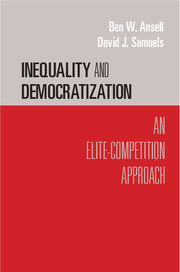Book contents
- Frontmatter
- Contents
- List of Tables
- List of Figures
- Preface
- I Introduction
- 2 Inequality, Development, and Distribution
- 3 Actors and Interests
- 4 An Elite-Competition Model of Democratization
- 5 Assessing the Relationship between Inequality and Democratization
- 6 Inequality and Democratization: Empirical Extensions
- 7 Democracy, Inequality, and Public Spending: Reassessing the Evidence
- 8 Democracy, Redistribution, and Preferences
- 9 Conclusion
- Bibliography
- Index
9 - Conclusion
Published online by Cambridge University Press: 05 January 2015
- Frontmatter
- Contents
- List of Tables
- List of Figures
- Preface
- I Introduction
- 2 Inequality, Development, and Distribution
- 3 Actors and Interests
- 4 An Elite-Competition Model of Democratization
- 5 Assessing the Relationship between Inequality and Democratization
- 6 Inequality and Democratization: Empirical Extensions
- 7 Democracy, Inequality, and Public Spending: Reassessing the Evidence
- 8 Democracy, Redistribution, and Preferences
- 9 Conclusion
- Bibliography
- Index
Summary
What explains the emergence of democracy? We offered a new answer to this question, by reinterpreting the relationship between economic development, patterns of inequality, and pressures for regime change.
Historically, conservatives have feared the consequences of modernization, while progressives have been more hopeful. Both sides agree that economic development brings about wholesale social, cultural, and political change. Scholars have long sought to identify more precisely the causal connection between political and economic development. Recent scholarship has shifted from the hypothesized impact of economic growth per se to the question of the political consequences of different patterns – equal or unequal – of growth.
Redistributivist approaches to regime change share the assumption that a tension necessarily exists between democracy and property, and share the inference that the wider the suffrage and the greater the economic inequality, the greater the danger to property. The notion that economic equality would inevitably follow political equality has long haunted the nightmares of those on the right and inspired the dreams of those on the left, and finds continued resonance in politics as in academia. We are hardly the first to shine a light on this ironic juxtaposition of Marxist and libertarian-conservative ideas; Karl Polanyi (1944), for example, noted that left- and right-wing interpretations of the world mirror each other, with both sides seeing politics as fundamentally characterized by conflict between rich and poor. Seeing politics as dominated by a war between opposing classes, Polanyi noted, radicals and reactionaries ironically end up holding identical views of the world (see also Hirschman 1991).
And yet, despite its broad appeal, and despite the fact that many countries do have large welfare states, theoretical support for the redistributive argument's assumptions as well as empirical evidence in its favor remain strikingly ambiguous. No clear and consistent cross-national relationship exists between democracy, inequality, and redistribution. In fact, although the idea that democracy and redistribution go hand in hand persists, no intellectual or political consensus has ever really existed that democracy and property are incompatible.
- Type
- Chapter
- Information
- Inequality and DemocratizationAn Elite-Competition Approach, pp. 203 - 210Publisher: Cambridge University PressPrint publication year: 2014



